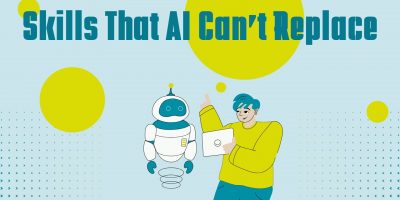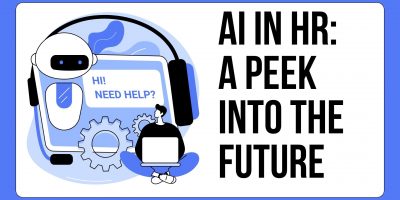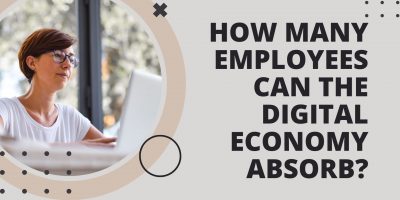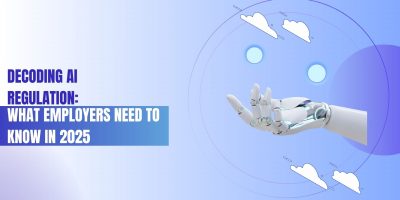
Skills That AI Can’t Replace
Which skills are futureproofed with an irreplaceable “human touch,” and how are emerging technologies driving the evolution of workforce skills?


CMO at Shine Interview

President at KOM Growth
In 2023, the nature of work is undergoing rapid transformation driven by technological breakthroughs. Generative artificial intelligence (AI), cloud computing, and big data are spurring a new revolution, transforming every industry from IT to manufacturing.
The explosion of interest in AI has drawn attention to the incredible capacity of algorithms to perform and mimic human capabilities but also to the harsh reality that these algorithms could displace many workers in their jobs.
Identifying the potential scale of economic, societal, and occupational disruption is crucial, as it enables policymakers, businesses, and educators to proactively develop workforce strategies that can mitigate the negative impacts.
This raises the most pressing question for employers and employees alike: which skills won’t be replaced by AI?
In this article, we examine which skills are futureproofed with an irreplaceable “human touch” and how emerging technologies are driving the evolution of workforce skills.
The speed of innovation and the momentum of technological advancements are clear indicators of the arrival of the Fourth Industrial Revolution.
Artificial intelligence is everywhere around us, from smart homes and robot vacuums to translating software and drones. Today, AI-powered machines can automate many tasks that humans once did, such as data entry, customer service, and even manufacturing.
As a result of these advancements, AI is already replacing human workers in some industries. For example, self-driving cars are poised to eliminate four million jobs in the transportation sector.
AI-powered chatbots are increasingly being used to handle customer service inquiries, which could also lead to job losses in that sector. According to The Future of Jobs Report 2023, the fastest declining roles are clerical and secretarial roles, with bank tellers, cashiers, and data entry clerks expected to decline the fastest.
Furthermore, recent breakthroughs in generative AI have garnered a lot of buzz, as they have the potential to automate many creative jobs, such as graphic design, writing, music production, and marketing. According to a recent Goldman Sachs study, generative AI tools could impact 300 million full-time workers worldwide.
While in the past, blue-collar jobs were at risk of being replaced, automation and AI also represent a threat to white-collar jobs. Advanced technologies like ChatGPT, which produce code faster than humans in many tech jobs, such as web developers, computer programmers, and software developers, are at risk too.
Companies are already taking notice of this trend. In May 2023, U.S.-based employers announced 80,089 job cuts, a 287% increase from the same month in 2022. Of these, around 5% were directly related to AI.

Global companies that announced the most considerable workforce reductions in 2023:
It is clear that the widespread adoption of AI has an impact on jobs and is causing a shift in the skills that are in demand by the job market.
Nevertheless, AI will not “take over the world” and replace humans in the workplace. Instead, it will augment human capabilities and create new opportunities for collaboration.
History shows that technological advancements have led to job creation, not job loss. A study by economist David Autor found that 60% of today’s jobs didn’t even exist in 1940, suggesting that technology has created more jobs than it has destroyed.
Essentially, the job market is constantly evolving, with old jobs disappearing and new ones being created all the time.
While AI has shown remarkable progress, there are specific skills AI can’t replace, which remain firmly rooted in human capabilities.
AI can only do what it is programmed to do, requiring constant maintenance and supervision. In some cases, AI systems have been known to make racist or sexist statements, and they have also been known to spread misinformation.
AI also has limited critical thinking and human creativity, at least for now. It can only work off other people’s data, inputs, and instructions that it is given, and it can’t come up with new ideas or solutions on its own.
Therefore, it cannot be leveraged to replace recruiters in the hiring process completely. Or as Chris Witthoft, CMO at Shine Interview, puts it:

Additionally, AI does not have social or emotional intelligence. AI can’t understand or navigate social interactions, which means that it will never be able to replace jobs that require complex political and strategic skills.
So, what does this mean for the future of work? It means that there will be a growing demand for jobs that require strategic thinking, creativity, empathy, and social intelligence.
Some of the non-automatable skills are:
Critical thinking and problem-solving: In a world full of information and data, workers who can tell which information is accurate, especially amidst a lot of false information, will be critical for a company to do well. AI can be helpful in crunching data and generating options, but it can’t match the human ability to think outside the box and solve problems.
Humans can weigh different factors, consider multiple perspectives, and develop creative solutions. This skill is essential for any job that requires problem-solving, such as engineering, medicine, and business.
Emotional intelligence: AI is still lacking emotional intelligence, and it is unlikely ever to match the human capacity for emotional understanding or empathy. Rob LaHayne, President at KOM Growth, explains, “One of the hardest skills to develop as a professional at any level is empathy. Besides compensation, empathy is the reason people work hard for one another.
It is the ability to make a human connection, understand what your colleagues are going through, and connect with one another on an emotional level that AI will never be able to replace.” This skill is essential for any job that involves working with people, such as sales, counseling, and teaching.
Creativity and innovation: Humans are naturally creative creatures. We are constantly coming up with new ideas, new ways of doing things, and new solutions to problems. AI can help generate ideas but can’t match human capabilities for creativity and innovation. This skill is essential for any job that requires innovation, such as design, marketing, and product development.
Adaptability and resilience: Humans are also highly adaptable and resilient. We can handle unpredictable situations and navigate change, as evidenced by the events of the pandemic. This skill is essential for any job that requires flexibility and the ability to work under pressure, such as project management and consulting.
Ethical decision-making: AI is still struggling with ethical decision-making. It can be challenging for AI to weigh the different factors involved in a complex moral dilemma and make a fair and just decision.
On the other hand, humans have a natural understanding of ethics and morality. We can use our judgment to make ethical decisions, even in difficult situations. This skill is essential for any job that involves making ethical decisions, such as law, healthcare, and finance.
In addition to the skills that AI can’t replace, there are also many other skills that are essential for success in the future of work.
A recent study by the World Economic Forum outlined the top 10 essential skills for adapting to an environment characterized by continuous change:
|
|
From this report, we see that cognitive skills, such as analytical and creative thinking, are the fastest-growing skills in demand in the workplace. However, interpersonal skills, technological skills, and self-management skills are all essential for success in the workplace.
The speed at which technology is evolving demands leaders to quickly adapt and learn how to implement new tools, models, and solutions.
However, leadership must never lose sight of the human element in technology. After all, technology is only as good as the people who operate it.
That’s why the future of work will be increasingly characterized by human-AI collaboration.
Human-AI partnerships are becoming an incessant source of innovation, and combining the unique strengths of humans and artificial intelligence can be used to achieve remarkable outcomes.
If we look at the latest data, we’ll notice that AI and generative AI have the potential to significantly boost labor productivity across the economy. In fact, a recent study by the McKinsey Global Institute found that AI could contribute $13 trillion to global economic output by 2030.

Here are some notable examples from the biggest industries in the US that highlight the successful adoption of AI in the workplace:
Healthcare Diagnosis
In healthcare, AI is used to develop new drugs and treatments, diagnose diseases more accurately, and provide personalized care. For example, IBM Watson is being used by hospitals to help doctors diagnose cancer more accurately. AI-powered diagnostic tools can highlight potential anomalies for further examination by human radiologists with more domain expertise, significantly improving diagnostic accuracy.
Financial Analysis and Trading
In finance, AI detects fraud, manages risk, and provides personalized investment advice. For example, Credit Karma uses AI to help people track their credit scores and identify areas where they can improve their financial wellness.
Typically, traders and investment managers leverage AI-powered tools to make informed decisions based on real-time market analysis. However, human experts are still essential to provide nuanced insights, considering factors such as global events, economic trends, and geopolitical developments.
Manufacturing and Quality Control
In manufacturing, AI is used to automate tasks, improve quality control, and optimize supply chains. For example, Amazon uses AI to detect damaged orders in its warehouses. Workers must supervise and maintain these systems, ensuring their optimal performance and addressing any unforeseen challenges.
In the Everyday Workplace
Human-AI collaboration can be found in various everyday workplace settings.
For example, AI in HR predicts employee turnover, identifies high-performing employees, and develops personalized training programs.
AI can be used to personalize learning experiences in LMSs, providing employees with the content and support they need to succeed. Many professionals use virtual assistants like Siri, Google Assistant, or Amazon Alexa to schedule meetings, set reminders, and retrieve information quickly. For companies that want to improve customer relationships using AI, buyer intent data can help retain customers, generate leads, and close deals.
In other words, the modern workplace is built on the foundation of AI and human capabilities working together.
Repetitive and low-skilled tasks are increasingly being automated, and with it emerges a pressing need to hone skills that complement the latest technological advancements.
According to a recent report by LinkedIn, the fastest-growing job postings on the platform from 2018 to 2022 were for AI and machine learning specialists, sustainability analysts, and business intelligence analysts.
As expected, with the increasing adoption of frontier technologies and rapid technological advancement, there comes a demand for specific jobs – mainly jobs requiring technological skills.
Many workers simply aren’t tech-savvy. In fact, almost a third of Americans struggle to use the Internet. With this representing a significant barrier to employment and cross-role mobility, there is a growing need for reskilling in America to address shifting talent needs.
But there is good news – workers are generally optimistic about the impact of AI on their work, as a recent PWC survey of nearly 54,000 workers found that more than half are optimistic about such an impact.
A third of respondents believe that AI will help increase productivity and efficiency, and more than a quarter said it would help them learn valuable new skills. Workers and employers alike who can upskill, reskill, and adapt to new technologies will be the ones who are most likely to succeed in the AI-driven economy.
So, how can companies ensure that their workforce remains adaptable, skilled, and well-equipped to thrive in a dynamic and ever-changing landscape?
We’ve listed some practical strategies organizations can take to foster and develop skills that won’t be easily replaced by AI within their workforce.
Provide training and development programs: If there’s one message to be highlighted, it’s that continuous learning initiatives should be at the heart of an organization’s strategy. One shocking employee training statistic states that six out of 10 workers will require training before 2027, but only half of those workers have access to adequate training opportunities.

Employers must design and scale up training programs that enhance human skills. To recognize that skills are constantly changing and set employees up for success, they must be equipped with the latest tools and techniques.
Companies investing in training programs covering a range of areas, from technical skills to soft skills, will have a competitive edge and drive sustainable success.
Invest in employee well-being and mental health: A healthy work environment is the foundation upon which human potential can flourish. By offering resources, workshops, and programs that promote work-life balance, stress management, and mental health awareness, organizations create an environment conducive to growth.
Collaborative Work Culture: Teamwork, knowledge sharing, and cross-functional collaboration are paramount in nurturing human skills. Encourage open communication and create platforms for employees to exchange ideas. Collaborative projects provide opportunities for skill integration, where employees with diverse skill sets work together, learning from one another and enhancing their abilities.
Encouraging Creativity and Innovation: Creating an environment that stimulates and rewards inventive thinking is essential. Establish innovation hubs, brainstorming sessions, and innovation challenges to inspire employees to think outside the box. Recognize and celebrate innovative ideas, showing employees their creativity is valued and supported.
In conclusion, there are many skills AI can’t replace. These human skills empower individuals to navigate complex situations, make ethical choices, innovate, and connect on emotional levels—attributes that AI currently lacks.
Artificial intelligence has limitations, and its true potential lies in complementing human abilities, not replacing them. Forward-thinking companies are already embracing AI as a tool and incorporating training and development programs that equip employees with the skills they need to thrive in the changing landscape.
As we venture into this exciting future, one thing is certain: the human touch remains irreplaceable.
Senior Content Writer at Shortlister
Browse our curated list of vendors to find the best solution for your needs.
Subscribe to our newsletter for the latest trends, expert tips, and workplace insights!

Which skills are futureproofed with an irreplaceable “human touch,” and how are emerging technologies driving the evolution of workforce skills?

Explore the evolving landscape of HR, offering a glimpse into how AI is poised to shape the future of human resources management.

Explore the implications of technology on the inevitable shift of the labor market and what this would mean for the future of work.

Are you ready to navigate the uncharted waters of AI regulation in 2025, where innovation races ahead, but the rules are still being written?
Used by most of the top employee benefits consultants in the US, Shortlister is where you can find, research and select HR and benefits vendors for your clients.
Shortlister helps you reach your ideal prospects. Claim your free account to control your message and receive employer, consultant and health plan leads.